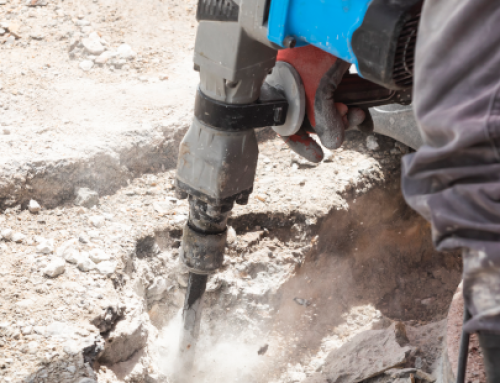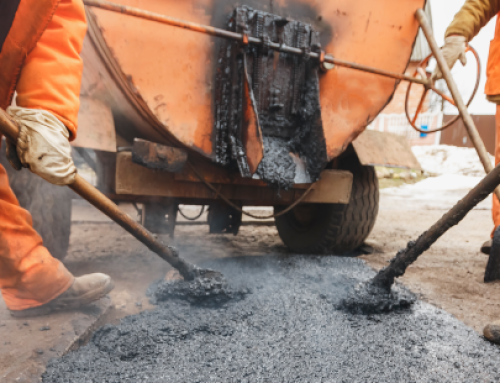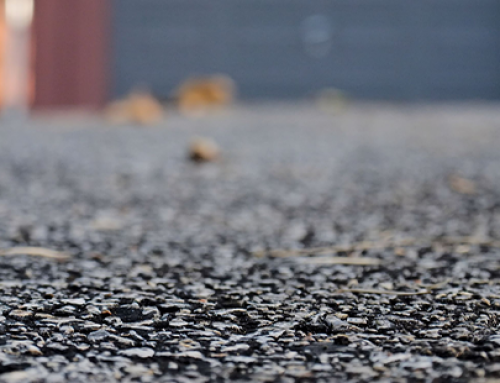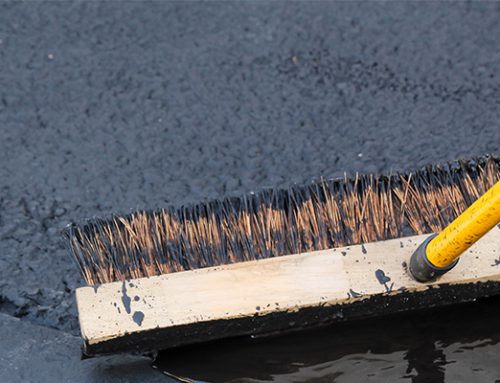Oil, transmission fluids, and gasoline can stain your driveway or garage floor and make it look discolored or greasy. Concrete is porous and holds dirt well, so it can be a tough surface to clean. Getting rid of stains can be a challenge, but it’s not impossible with the right cleaner and some elbow grease.
Regardless of whether a spot is old or new – these everyday household products can help remove unsightly stains and improve the appearance of your driveway or garage.
1. Concentrated Soap
Using the right soap in the right concentration can be a miracle oil-stain remover – along with some strong scrubbing, of course. One soap that effectively removes oil from concrete is Mrs. Meyer’s Clean Day Multi-Surface Concentrate. It’s a natural-ingredient liquid soap sold in 32-ounce bottles and is typically diluted for general household cleaning. Other natural soaps may also work well, but any product should be used in concentrated form when cleaning oil stains. (At full strength, the vapors in Mrs. Meyer’s concentrate may cause your eyes to sting a little.)
Follow these steps to use concentrated soap to remove oil stains:
- Soak it Up Immediately
Tackle fresh oil stains by blotting up as much as possible with rags or paper towels. Simply lay them over the spill and let the oil soak in for several seconds. Don’t rub the spill because that will only spread the oil around or rub it in deeper.
- Apply Soap and Scrub
Apply the concentrated soap full-strength directly on the stain. Scrub vigorously with a stiff nylon brush.
- Rinse and Repeat
Rinse the area with a garden hose and nozzle – if possible, use a strong stream. Repeat the process once or twice to remove the stain completely. You’ll know the oil is gone when the rinse water no longer beads on the concrete surface.
2. Oven Cleaner
Oven cleaner is an effective treatment for oil stains. Simply spray the stain with oven cleaner and let it sit for 10 minutes. Use a stiff bristle brush to scrub it clean, then rinse it off with a hose. Repeat this process until the stain is removed.
3. Inexpensive Cat Litter
For significant oil stains, cover the stain with inexpensive cat litter. Grind and crush the litter into the stain with your foot. Let it sit for an hour to absorb the oil – then sweep it up and discard it.
For heavy stains, let the cat litter set overnight after crushing it – then sweep it off. Use a heavy-duty detergent soap to wash the area with a stiff brush. Rinse with water and repeat as necessary.
4. Baking Soda
Like oven cleaner, you can cover an oil stain with baking soda. Wait about 30 minutes, then rinse it off with a hose. If that doesn’t do the trick, apply more baking soda to the stain and let sit another half-hour. Then use a stiff, wet brush to scrub the stain and rinse with water.
Another pantry item to try is vinegar or vegetable oil. Follow the same instructions as the baking soda.
5. Sawdust and Paint Thinner
Sawdust is an excellent option because it’s absorbent, like cat litter, and can soak up oil. Paint thinners act as solvents that dilute the oil. Combine them to create an effective way to remove oil from your garage floor or driveway.
Mix sawdust with paint thinner until it’s damp, then spread the wet sawdust over the stain. Let it soak into the oil stain for 20-30 minutes. Sweep up the sawdust and repeat if necessary. This is a good first step for heavy oil stains – followed by cleaning with concentrated detergent.
6. Coke
Coke has been an effective cleaner and stain remover for generations. So, using old-fashioned coke may be the easiest and least expensive solution to remove oil stains.
Simply pour two cans of Coke onto the oil stain. Wait a day so it can work its magic, then wash it off with a garden hose. For stubborn stains, you may need to repeat the process.
7. WD-40
Most homes have a can of WD-40 in the garage. With over 2,000 uses, this multi-purpose solvent can also remove oil stains from your driveway.
If the oil spill is still wet, first soak up as much of it as you can with a paper towel – remember not to rub the oil. Once you’ve soaked up the oil, spray the area with a generous amount of WD-40, and let it sit for 5 minutes. Then, wipe it with an old rag.
If that doesn’t do the trick, pour dish soap on the remaining stain. Then add hot water and scrub the stain with a bristle brush. Rinse with a bucket of boiling water. After it dries, the stain should be gone.
8. Combine Methods
Sometimes it takes some unusual solutions to get rid of oil stains on concrete. Instead of only using one idea on this list, combine several methods into one powerful solution.
You’ll need some inexpensive cat litter, liquid laundry detergent, a few cans of coke, and bleach. You’ll also need rubber gloves, a broom, and goggles to protect your eyes.
Start by applying a thin layer of cat litter over the stain. Then pour coke over the area and mix it in with your broom. Let it stand for 20-30 minutes. Next, mix ¼ cup of liquid laundry detergent with ¼ cup of bleach in one gallon of warm water. Use this magic solution to remove the oil stain.
If you don’t want to create your own solution, you can purchase these last two products at your local hardware or home improvement store.
9. Concrete Cleaner or Degreaser
There’s a wide variety of cleaners designed to remove stains and clean concrete surfaces. You can learn about the different types of concrete cleaners and how to choose the best one for your project here.
10. Biodegradable Microbial Concrete Cleaner
The microbes in these cleaners literally eat away the oil and grease. They’re safe around animals and plants and only leave behind water and carbon dioxide as waste products.
For large areas, use a pump sprayer to apply the solution and wait for it to consume the oil. For stubborn stains, this may take 24 hours. Once the solution dissolves away the oil, you can clean the area with soap and water.
Final Thoughts
You may need to experiment with several of these tips to find the best way to remove the oil stains from your driveway. Once it’s stain-free, you may want to have your driveway sealed. Sealing your concrete driveway or garage floor is a wise investment that can reduce cracks and protect your driveway and garage from future oil and transmission fluid stains.
At Premium Asphalt Paving & Sealcoating, our driveway sealing contractors carefully work to clean, coat, and cure your pavement for extensive protection and durability. Contact us today to learn more about our services and get a free estimate for your next project.








